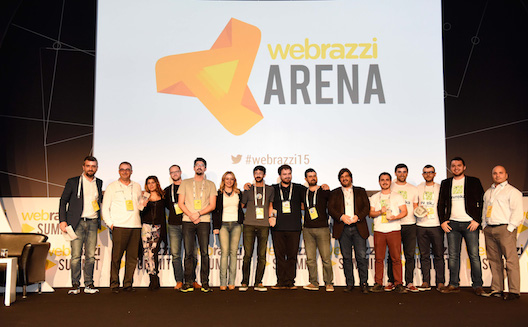Webrazzi Summit 2015, a springboard for Turkish techheads


Winners
of the Webrazzi Summit 2015. (Image via
Webrazzi)
As several hundred innovative minds gathered over two days to share ideas and showcase technologies in Istanbul last week, Webrazzi Summit 2015 provided a welcome counter to Turkey’s poor economic outlook.
Indeed, if the conference is anything to go by, the environment for local tech startups remains as healthy as it has ever been.
It was quite telling, for instance, that all the startup finalists in this international conference were Turkish.
Moreover, the number of local entrepreneurs with technologies on display during the summit was impressive. Serkan Ünsal, an experienced Turkish entrepreneur whose leisure planning startup dakick was acquired by Turkcell in 2014, proudly displayed his latest startup investment analytics platform startups.watch. He explained a soon-to-be-put-in-place plan to expand into the Middle East region.
If the conference center represented the innovative engine of the event, the two adjoining rooms acted as its creative inspiration.
Here, senior executives from local and international companies including IBM and Amazon gave keynote speeches on a range of topics, from pitching ideas for startups to building a sustainable technology ecosystem.
Running in tandem were half a dozen workshops aimed at providing further insights into best working practices.
As with Istanbul Start Up 2015 before it, the Webrazzi Summit 2015 concluded with a start up competition. From hundreds of applicants, 12 finalists were selected to compete against each other in front of a jury for a chance to promote their business and potentially attract further investment.
In the end the three winners were selected. They were:
-
Mobile crowd surfing platform Twentify
-
Waste management smart technology provider Evreka
-
Marketing designers Segmentify
Crucially, all three winners of the Webrazzi Start Up 2015 competition secured investment from Silicon Valley venture capitalist firm 500 Startups.
The announcement, made by Erhan Erdoğan, a venture partner for the company’s Turkey office, was great news for the three firms concerned. Not only that, it is also indicative of the fact that despite political uncertainties in the country ahead of November’s parliamentary elections, continued interest by investors in Turkish internet startups remains positive.
Evidence of this was reported by Wamda last week with the news that 500 StartUps has set up a $15 million fund to invest in 30 Turkish startups a year with follow on capital of 15 to 20 percent.
Another investor, Dalton Caldwell, partner at Y Combinator in San Francisco, said his company already funds three Turkish startups (Zeplin, EBrandValue and Vizera Labs) and could potentially be looking at further investments.
As the startup ecosystem begins to take hold in Turkey, several participants of the Webrazzi summit expressed optimism about the development potential for the local tech industry.
It was repeatedly expressed to Wamda that the inherent Turkish entrepreneurial spirit was key to the industry growing. And there is truth in the assertion, although other contributory factors are bigger drivers.
Take for example the demographic situation. Broadly speaking, half of Turkey’s population of 77 million is under 30. This means that there is huge potential of talent given the predominantly well-educated work force.
Related to this is the caliber of graduates.
According to a recent report by the OECD in 2015 18 percent of Turkish university graduates had studied science and engineering. This compares rather more favorably than many other countries including Brazil, Chile, Holland, Norway, Poland and the US in terms of percentage.
And despite the report also stating that daily access to the internet was around only 35 percent, the percent figure is quite high in comparison to other developing countries like Mexico. Furthermore, the penetration rate for users of mobile devices is very high at over 80 percent of the population.
Evidently obstacles remain, not least of which is the lack of finance in areas like R&D. But government-funded agencies including the Scientific and Technological Research council of Turkey (Tubitak) are working to fill that gap, and the general feedback from many local participants in their dealings with the organisation were positive.
The other nine finalists included:
Ekmob: A field operations management platform.
Gaaraj: Mobile first car rental service.
Kullanıcı Ajansı: an advanced product-testing platform.
Otsimo: an open source educational platform for children who have autism.
Pubinno: a provider of smart solutions to the beverage sector.
SOR’UN: CCM platform provider to companies.
ComPay: Online payment solutions for those who do not use credit cards.
Viviso: Targets video advertisements for online TV.
Special mention was given to İyisahne.com, a mobile marketplace for event organisation


